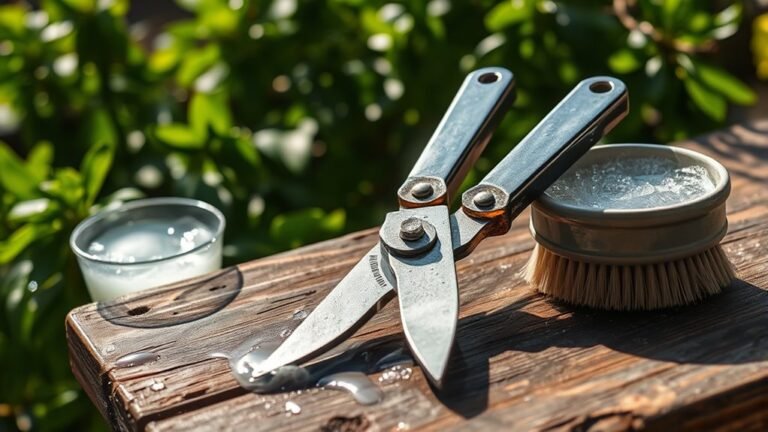Natural Alternatives to Grout
You can choose natural grout alternatives like clay-based mixtures, lime mortar, or natural stone dust combined with resin to create eco-friendly, durable, and uniquely styled joints. These options reduce harsh chemicals, support sustainability, and offer breathability to prevent damage. Plant-based sealants such as beeswax enhance water resistance while keeping your space healthier. Natural grout requires gentle maintenance but lasts well with proper care. If you want to know how to apply and maintain these options, there’s plenty more to explore.
Benefits of Using Natural Grout Alternatives

Although traditional grout is widely used, natural alternatives offer several benefits that you might find appealing. When you choose eco friendly materials, you’re not just making a design choice—you’re embracing a lifestyle of freedom from harmful chemicals and waste. Natural grout alternatives align perfectly with sustainable building principles, reducing your environmental footprint while maintaining durability and aesthetic appeal. You’ll enjoy improved indoor air quality since these materials often emit fewer toxins. Plus, many natural options are easier to source locally, supporting communities and cutting down on transportation emissions. By opting for these alternatives, you take control over your space and its impact, creating a healthier, more sustainable environment that reflects your values and desire for independence. It’s a simple step toward living consciously and freely.
Clay-Based Grout Options
When you want a natural grout option that’s both eco-friendly and easy to work with, clay-based grout is worth considering. Its clay composition provides a flexible, breathable material that adapts well to different surfaces. Plus, you get beautiful color variations naturally derived from the earth, allowing your creativity to flow freely.
Here’s why clay-based grout might be your perfect choice:
- Environmentally friendly and biodegradable.
- Offers natural color variations for unique aesthetics.
- Easy to mix and apply, giving you control over the process.
- Breathable and flexible, reducing cracking and damage over time.
Choosing clay-based grout lets you embrace sustainable living without sacrificing style or freedom in your design.
Lime Mortar as a Sustainable Choice

If you’re looking for a natural material that’s both durable and eco-friendly, lime mortar is a great option to contemplate. Its lime mortar properties include excellent flexibility and breathability, which means it can handle slight movements without cracking—perfect if you want your surfaces to last without constant repairs. As an environmentally friendly mortar, lime mortar uses fewer harsh chemicals compared to conventional grout, reducing your ecological footprint. Plus, it absorbs and releases moisture naturally, helping prevent damage from trapped water. Choosing lime mortar lets you embrace a sustainable approach while maintaining strong, resilient joints in your projects. It’s a smart choice that aligns with your desire for freedom—freedom from synthetic chemicals and freedom to build with materials that respect the planet.
Natural Stone Dust and Resin Mixtures
Since you want a grout alternative that combines natural elements with strong bonding, natural stone dust mixed with resin might be just what you need. This blend offers durability and a unique aesthetic without relying on synthetic chemicals. When exploring stone dust applications, you’ll appreciate how resin mixing enhances adhesion and flexibility, letting you create seamless joints that last.
Here’s why this option might appeal to you:
- Uses readily available natural stone dust, reducing waste.
- Resin mixing boosts strength, resisting cracks and wear.
- Allows customization of color and texture for freedom in design.
- Easy to apply and clean, making your project smoother.
This approach frees you from conventional grout limits while embracing nature’s own materials.
Plant-Based Sealants for Tiling

You’ll find plant-based sealants offer natural protection while being eco-friendly and safe for your home. Ingredients like linseed oil, beeswax, and soy provide durable, moisture-resistant finishes for your tiles. With a few simple application tips, you can easily achieve a smooth, long-lasting seal without harsh chemicals.
Benefits of Plant Sealants
While exploring natural alternatives to grout, you’ll find that plant-based sealants offer impressive benefits for tiling projects. Choosing these eco friendly materials supports sustainable building practices and gives you more control over your environment. Here’s why you might want to take into account plant sealants:
- They reduce exposure to harsh chemicals, making your space healthier.
- Their biodegradable nature means less environmental impact when you renovate.
- They often provide excellent water resistance, protecting your tiles effectively.
- Using plant-based options aligns with a lifestyle that values freedom from synthetic, toxic products.
Common Plant-Based Ingredients
Plant-based sealants rely on natural ingredients that offer both effectiveness and environmental benefits. When you choose these sealants, you’re often working with plant based adhesives derived from sources like soy, flaxseed, or pine resins. These adhesives provide strong bonding without harsh chemicals, giving you freedom from toxic fumes. Alongside adhesives, eco friendly pigments from minerals and plant extracts add subtle, natural hues to your tiling, enhancing beauty while staying green. These ingredients blend to create sealants that are both durable and kind to the planet, letting you maintain your tile’s integrity without compromising your values. Embracing these plant-based components means you’re not only sealing tiles but also opening doors to sustainable living.
Application Tips and Tricks
Although natural sealants may require a bit more care during application, following a few simple tips can guarantee a smooth, long-lasting finish. When working with plant-based grout alternatives, mastering your application techniques is key to freedom from harsh chemicals and tedious repairs.
- Clean surfaces thoroughly to confirm the sealant bonds well.
- Use a flexible applicator like a rubber float for even spreading.
- Work in small sections to prevent the sealant from drying too quickly.
- Allow adequate curing time—natural ingredients often need longer to set properly.
Beeswax and Other Natural Sealers
If you want to protect your grout naturally, beeswax is a great option because it creates a water-resistant barrier. You can also explore other natural sealers like linseed oil or soy-based products that offer similar benefits. These alternatives help keep your grout durable without relying on harsh chemicals.
Beeswax Benefits for Grout
When you want to protect your grout without harsh chemicals, beeswax offers a natural and effective solution. Thanks to its unique beeswax properties, it seals grout lines, repelling moisture and dirt while allowing the surface to breathe. This means you gain lasting protection without sacrificing natural materials. With beeswax applications, you can enjoy a clean, durable finish that resists staining and cracking. Here’s why beeswax stands out:
- Creates a water-resistant barrier that prevents mold and mildew.
- Enhances grout’s durability, extending its lifespan.
- Maintains natural breathability, avoiding trapped moisture.
- Easy to apply and eco-friendly, supporting your freedom from synthetic chemicals.
Using beeswax lets you safeguard your grout naturally, embracing freedom in home care.
Natural Sealer Alternatives
Because grout is prone to moisture and stains, choosing the right sealer is essential for lasting protection. If you want to break free from harsh chemicals, you’ll appreciate natural resin-based sealers. These eco friendly options create a breathable barrier that repels water without trapping moisture, keeping grout healthier. Beeswax is a standout natural sealer—it’s easy to apply and adds a subtle sheen while protecting surfaces. Other plant-based oils and resins also provide durable, non-toxic finishes that align with your commitment to a cleaner, greener home. By opting for natural sealers, you maintain your freedom from synthetic products and contribute to a sustainable lifestyle. You don’t have to sacrifice performance for eco friendliness—these natural alternatives prove you can have both.
How to Apply Natural Grout Alternatives
Although applying natural grout alternatives might seem challenging at first, you’ll find the process straightforward once you understand the basic steps. Choosing eco friendly options made from sustainable materials not only benefits the planet but also gives you the freedom to customize your space. Here’s how to get started:
Applying natural grout alternatives is simple and eco friendly, offering customization and sustainability for your space.
- Clean the joints thoroughly to remove old grout and debris.
- Mix your natural grout alternative according to the product instructions.
- Use a rubber float to press the mixture firmly into the gaps.
- Wipe away excess material and let it cure as directed, ensuring durability.
Maintenance Tips for Natural Grout Substitutes
Since natural grout substitutes are often more porous than traditional grout, you’ll need to take extra care to keep them clean and protected. Start by using gentle natural cleaning solutions like vinegar diluted with water or baking soda paste to avoid harsh chemicals that can eat away at the material. Avoid abrasive scrubbing tools that might damage the surface. Wipe spills promptly to prevent stains and moisture absorption, which can shorten grout longevity. Applying a natural sealant periodically will create a protective barrier, helping to repel dirt and water. Remember, consistent care keeps your grout substitutes looking fresh and extends their lifespan, giving you the freedom to enjoy your space without constant worry or replacement costs. Embrace maintenance routines that align with your values and lifestyle for lasting results.
Frequently Asked Questions
Are Natural Grout Alternatives Suitable for Outdoor Tiling?
If you’re considering outdoor tiling, you’ll want materials with excellent weather resistance and outdoor durability. Some natural grout alternatives can handle exposure to rain, sun, and temperature swings, but not all are created equal. You’ll need to pick one that stands up to these elements, so your tiles stay secure and looking great. Choosing the right option lets you enjoy your outdoor space without worrying about constant upkeep or damage.
Can Natural Grout Substitutes Be Used on Bathroom Floors?
Did you know that 60% of homeowners prefer eco friendly materials in their bathrooms? You can absolutely use natural grout substitutes on bathroom floors. These options not only enhance bathroom aesthetics with unique textures and colors but also let you embrace a greener lifestyle. By choosing natural materials, you’re freeing yourself from harsh chemicals while creating a space that feels fresh, stylish, and truly your own. It’s a win-win for your home and the planet.
How Long Do Natural Grout Alternatives Typically Last?
You’ll find that natural grout alternatives typically last several years, depending on the material and how well you maintain them. Their sustainability benefits make them a smart choice if you value eco-friendly living, but they usually require more frequent upkeep than traditional grout. With regular sealing and cleaning, you’ll enjoy durability while embracing freedom from harsh chemicals. Just stay on top of maintenance, and these alternatives can serve you well over time.
Are Natural Grout Options Safe for People With Allergies?
When it comes to your health, it’s better to be safe than sorry. You’ll find eco friendly materials often serve as allergy friendly options, minimizing irritants like harsh chemicals and synthetic additives. These choices let you breathe easy and enjoy your space without worry. So, if you’re seeking freedom from allergens, opting for natural, gentle ingredients is a smart move that keeps both your home and well-being in harmony.
Do Natural Grout Alternatives Require Special Tools for Application?
You don’t usually need special tools for application when working with natural grout alternatives. The tool requirements are pretty straightforward—basic items like a grout float, sponge, and bucket often do the trick. If you’re used to traditional grout, you might notice slight differences in application techniques, but nothing too complicated. This simplicity gives you the freedom to experiment and apply the grout yourself without investing in fancy equipment.






